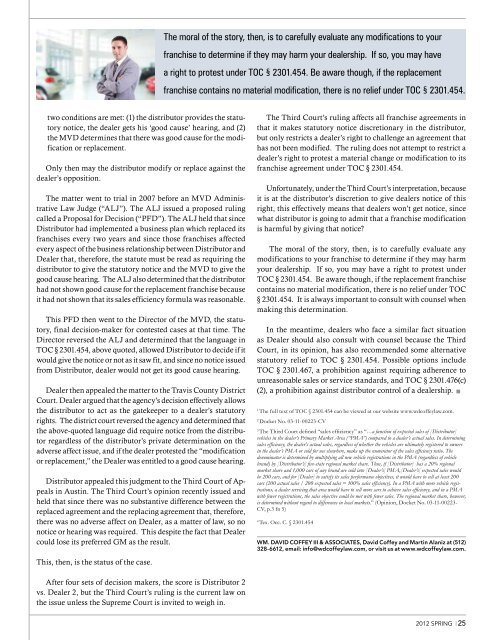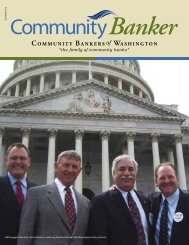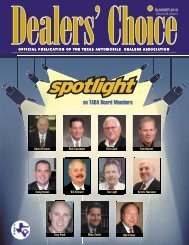Stacey Gillman Wimbish Stacey Gillman Wimbish - Media ...
Stacey Gillman Wimbish Stacey Gillman Wimbish - Media ...
Stacey Gillman Wimbish Stacey Gillman Wimbish - Media ...
- No tags were found...
Create successful ePaper yourself
Turn your PDF publications into a flip-book with our unique Google optimized e-Paper software.
The moral of the story, then, is to carefully evaluate any modifications to yourfranchise to determine if they may harm your dealership. If so, you may havea right to protest under TOC § 2301.454. Be aware though, if the replacementfranchise contains no material modification, there is no relief under TOC § 2301.454.two conditions are met: (1) the distributor provides the statutorynotice, the dealer gets his ‘good cause’ hearing, and (2)the MVD determines that there was good cause for the modificationor replacement.Only then may the distributor modify or replace against thedealer’s opposition.The matter went to trial in 2007 before an MVD AdministrativeLaw Judge (“ALJ”). The ALJ issued a proposed rulingcalled a Proposal for Decision (“PFD”). The ALJ held that sinceDistributor had implemented a business plan which replaced itsfranchises every two years and since those franchises affectedevery aspect of the business relationship between Distributor andDealer that, therefore, the statute must be read as requiring thedistributor to give the statutory notice and the MVD to give thegood cause hearing. The ALJ also determined that the distributorhad not shown good cause for the replacement franchise becauseit had not shown that its sales efficiency formula was reasonable.This PFD then went to the Director of the MVD, the statutory,final decision-maker for contested cases at that time. TheDirector reversed the ALJ and determined that the language inTOC § 2301.454, above quoted, allowed Distributor to decide if itwould give the notice or not as it saw fit, and since no notice issuedfrom Distributor, dealer would not get its good cause hearing.Dealer then appealed the matter to the Travis County DistrictCourt. Dealer argued that the agency’s decision effectively allowsthe distributor to act as the gatekeeper to a dealer’s statutoryrights. The district court reversed the agency and determined thatthe above-quoted language did require notice from the distributorregardless of the distributor’s private determination on theadverse affect issue, and if the dealer protested the “modificationor replacement,” the Dealer was entitled to a good cause hearing.Distributor appealed this judgment to the Third Court of Appealsin Austin. The Third Court’s opinion recently issued andheld that since there was no substantive difference between thereplaced agreement and the replacing agreement that, therefore,there was no adverse affect on Dealer, as a matter of law, so nonotice or hearing was required. This despite the fact that Dealercould lose its preferred GM as the result.This, then, is the status of the case.The Third Court’s ruling affects all franchise agreements inthat it makes statutory notice discretionary in the distributor,but only restricts a dealer’s right to challenge an agreement thathas not been modified. The ruling does not attempt to restrict adealer’s right to protest a material change or modification to itsfranchise agreement under TOC § 2301.454.Unfortunately, under the Third Court’s interpretation, becauseit is at the distributor’s discretion to give dealers notice of thisright, this effectively means that dealers won’t get notice, sincewhat distributor is going to admit that a franchise modificationis harmful by giving that notice?The moral of the story, then, is to carefully evaluate anymodifications to your franchise to determine if they may harmyour dealership. If so, you may have a right to protest underTOC § 2301.454. Be aware though, if the replacement franchisecontains no material modification, there is no relief under TOC§ 2301.454. It is always important to consult with counsel whenmaking this determination.In the meantime, dealers who face a similar fact situationas Dealer should also consult with counsel because the ThirdCourt, in its opinion, has also recommended some alternativestatutory relief to TOC § 2301.454. Possible options includeTOC § 2301.467, a prohibition against requiring adherence tounreasonable sales or service standards, and TOC § 2301.476(c)(2), a prohibition against distributor control of a dealership. 1The full text of TOC § 2301.454 can be viewed at our website www.wdcoffeylaw.com.2Docket No. 03-11-00223-CV3The Third Court defined “sales efficiency” as “…a function of expected sales of [Distributor]vehicles in the dealer’s Primary Market Area (“PMA”) compared to a dealer’s actual sales. In determiningsales effi ciency, the dealer’s actual sales, regardless of whether the vehicles are ultimately registered to ownersin the dealer’s PMA or sold for use elsewhere, make up the numerator of the sales effi ciency ratio. Thedenominator is determined by multiplying all new vehicle registrations in the PMA (regardless of vehiclebrand) by [Distributor’s] fi ve-state regional market share. Thus, if [Distributor] has a 20% regionalmarket share and 1,000 cars of any brand are sold into [Dealer’s] PMA,[Dealer’s] expected sales wouldbe 200 cars, and for [Dealer] to satisfy its sales performance objectives, it would have to sell at least 200cars (200 actual sales / 200 expected sales = 100% sales effi ciency). In a PMA with more vehicle registrations,a dealer servicing that area would have to sell more cars to achieve sales effi ciency, and in a PMAwith fewer registrations, the sales objective could be met with fewer sales. The regional market share, however,is determined without regard to differences in local markets.” (Opinion, Docket No. 03-11-00223-CV, p.3 fn 5)4Tex. Occ. C. § 2301.454WM. DAVID COFFEY III & ASSOCIATES, David Coffey and Martin Alaniz at (512)328-6612, email: info@wdcoffeylaw.com, or visit us at www.wdcoffeylaw.com.After four sets of decision makers, the score is Distributor 2vs. Dealer 2, but the Third Court’s ruling is the current law onthe issue unless the Supreme Court is invited to weigh in.2012 SPRING 25
















